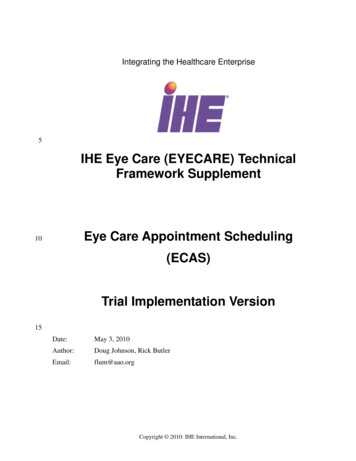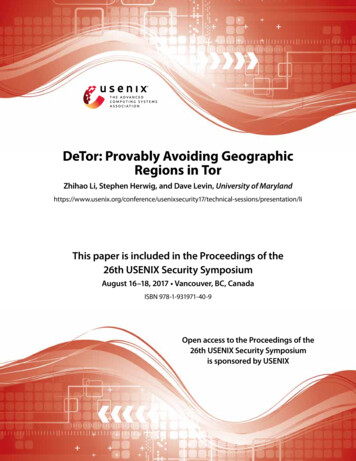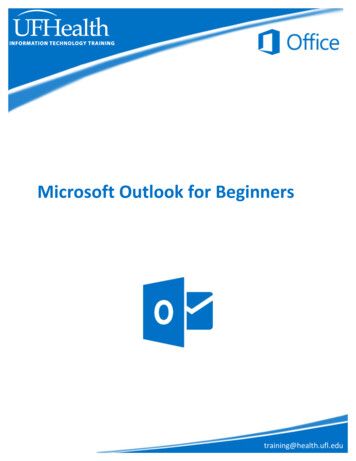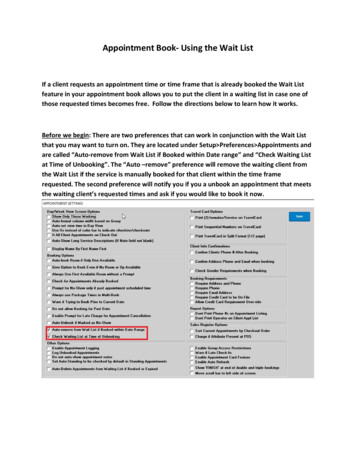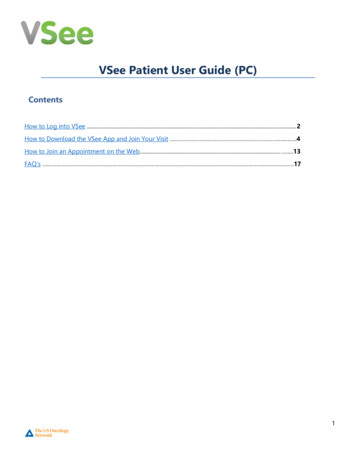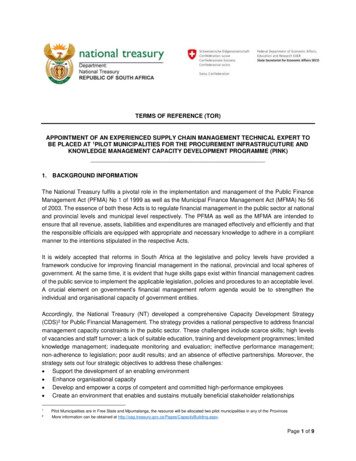
Transcription
TERMS OF REFERENCE (TOR)APPOINTMENT OF AN EXPERIENCED SUPPLY CHAIN MANAGEMENT TECHNICAL EXPERT TOBE PLACED AT 1PILOT MUNICIPALITIES FOR THE PROCUREMENT INFRASTRUCUTURE ANDKNOWLEDGE MANAGEMENT CAPACITY DEVELOPMENT PROGRAMME (PINK)1. BACKGROUND INFORMATIONThe National Treasury fulfils a pivotal role in the implementation and management of the Public FinanceManagement Act (PFMA) No 1 of 1999 as well as the Municipal Finance Management Act (MFMA) No 56of 2003. The essence of both these Acts is to regulate financial management in the public sector at nationaland provincial levels and municipal level respectively. The PFMA as well as the MFMA are intended toensure that all revenue, assets, liabilities and expenditures are managed effectively and efficiently and thatthe responsible officials are equipped with appropriate and necessary knowledge to adhere in a compliantmanner to the intentions stipulated in the respective Acts.It is widely accepted that reforms in South Africa at the legislative and policy levels have provided aframework conducive for improving financial management in the national, provincial and local spheres ofgovernment. At the same time, it is evident that huge skills gaps exist within financial management cadresof the public service to implement the applicable legislation, policies and procedures to an acceptable level.A crucial element on government’s financial management reform agenda would be to strengthen theindividual and organisational capacity of government entities.Accordingly, the National Treasury (NT) developed a comprehensive Capacity Development Strategy(CDS)2 for Public Financial Management. The strategy provides a national perspective to address financialmanagement capacity constraints in the public sector. These challenges include scarce skills; high levelsof vacancies and staff turnover; a lack of suitable education, training and development programmes; limitedknowledge management; inadequate monitoring and evaluation; ineffective performance management;non-adherence to legislation; poor audit results; and an absence of effective partnerships. Moreover, thestrategy sets out four strategic objectives to address these challenges: Support the development of an enabling environment Enhance organisational capacity Develop and empower a corps of competent and committed high-performance employees Create an environment that enables and sustains mutually beneficial stakeholder relationships12Pilot Municipalities are in Free State and Mpumalanga, the resource will be allocated two pilot municipalities in any of the ProvincesMore information can be obtained at aspx.Page 1 of 9
1.1The PINK CD ProgrammeThe overall objective of the PINK CD programme is ‘increased cost effective, socially inclusive andsustainable service delivery at provincial and local government level’. To achieve this objective, theprogramme is aligned with the priorities of the National Treasury and aims to address two of the maincauses of irregular, fruitless and wasteful expenditure within municipalities that impact significantly on theirability to provide basic services to all – weak procurement practices and poor infrastructure management.In addition, the programme is mindful of the low capacity within many municipalities (and some ProvincialTreasuries (PT’s) to make sense of and fully comply with all of the legislation, policies and guidelinesalready covering procurement and infrastructure management.The overall objective will be achieved through three key result areas (KRA): KRA 1 – More effective supply chain management (procurement) at local government level. KRA 2 – Enhanced infrastructure management (budgeting, planning and asset management) atlocal government level. KRA 3 - Crosscutting Activity – Knowledge Management and Peer LearningWhile the focus of the programme will be at local government level, all KRA’s include support to NationalTreasury and some Provincial Treasuries to strengthen them in their (constitutional and legal) role toprovide support to the municipalities. The first two KRAs rely heavily on knowledge management andpeer learning, which, together with the support to be provided to National Treasury in this regard, areincluded as cross-cutting activities for both KRA’s.SUMMARY OF THE ASSIGNMENTNAME OF PROJECTSCM Technical Experts for pilot municipalitiesPROJECT NUMBERPINK COMPONENT / KRA3.3KRA 1 – More effective supply chain(procurement) at local government levelINTERNAL CLIENTOffice of the Chief Procurement Office (OCPO)PROJECT LEADDirector: Donor MobilizationPROJECT TIMELINE24 monthsmanagement2. OBJECTIVE OF THE PROJECT2.1Overall objective of the assignmentThe PINK project aims to create more effective supply chain management (procurement) at local government level.To reach this objective the project works together and within 3 layers of government according to the followingdelivery model.Page 2 of 9
National Treasury LevelThe existing regulations, toolkits, and training programmes for Supply Chain Management will either beimplemented as they are, developed or enhanced, and peer learning mechanisms and knowledgemanagement platform established for purposes of disseminating toolkits to pilot municipalities.Thisprocess will be done in conjunction with the PT’s to ensure that the solutions developed address themunicipalities needs.Provincial Treasury LevelOnce toolkits for SCM have been developed at NT level, PT’s will be capacitated on these so that they areable to support the municipalities. With the assistance of the SCM Technical Experts, the toolkit will bedisseminated to be piloted in selected municipalities (using training and peer learning amongst other things)before being revised and placed, together with the guidelines, on the KMU knowledge platform. NT andPTs will be provided with materials to assist them to raise awareness of the new approaches and tools withmunicipal finance management staff and Municipal Councils.Municipal LevelIn the pilot municipalities, the adjusted or developed regulations, toolkits, training programmes,implementation support mechanisms and various knowledge management instruments will be tested. Atthe same time, capacity assessments and improvement plans will be prepared for each individual pilotmunicipality and these reviews and plans will inform the further development of the toolkits, trainingprogrammes and knowledge management instruments. In order to strengthen SCM/IM oversight byCouncilors, training programmes for councilors on SCM and IM oversight will also be developed andpiloted at selected municipalities.The objective of this assignment is to appoint a qualified, skilled, and experienced Supply ChainManagement Technical Expert (SCM TE) to be placed at selected municipalities for a period of 24 months.The purpose of the assignment is to provide SCM advisory support to municipalities.3. SCOPE OF WORK3.1 General ActivitiesTask 1: Provide “on the job” SCM support to the two municipalities assigned and facilitate theformulation and implementation of municipal improvement plans.Municipal improvement plans will be developed in conjunction with the Provincial Treasuries (PT) andMunicipalities based upon a baseline assessment to be conducted by a team of experts prior to thecommencement of the SCM TE’s.Page 3 of 9
Interventions will be designed around facilitating the development and putting in place of appropriateeducation and training opportunities for provinces and municipalities as clients. This will provide anenvironment where professionals have decentralised access to the appropriate information and skills toimplement the developed standard and obtain the necessary tools for alignment. The primary target will bemunicipalities, although significant support will also be provided to provincial treasuries to assistmunicipalities in their provinces to implement the piloted tools and activities.The TE’s will in conjunction with the PT’s facilitates the process of nomination of project champions at eachmunicipality and together with the NT Knowledge Management begin to establish Communities of Practicein both Provinces. These communities of practise will be actively involved in the piloting of new tools andapproaches developed under the project and revise toolkits if necessary.Responsibilities include: Build and maintain positive working relationships with PT’s, municipalities and other stakeholders; Serve as resources for technical advisory on the PINK SCM projects; Promote learning and cooperation for improved service delivery and sustainability;Task 2; Provide support in the dissemination of the toolkits to municipalities developed underPINK Project 1: “Enhance specific SCM regulations and toolkits customized to municipal needs”.Further development of specific SCM regulations and toolkits (preferential procurement, contractmanagement, infrastructure standards/ procurement, demand management), customized to municipalneeds. The regulations and toolkits will be piloted in municipalities disseminated through the KM platform.Responsibilities include:-Disseminate relevant SCM regulations with project counterparts-Support the development and piloting of PINK toolkits;-Contribute to the revision of methodologies and tools based upon experienceTask 3: Facilitate PINK project implementationEstablishment of an SCM implementation support mechanism and provision of advisory and assistance topilot municipalities through the PT’s on the basis of the MFIP III model as a delivery solution. Support willbe provided to PT’s and municipalities both institutionally and technically by strengthening their ability tocapacitate the municipal financial management units to perform the duties necessary to ensure compliancewith the MFMA and to build the capacity of the appointed staff through training and development.Responsibilities include:Page 4 of 9
-Support knowledge generation including the identification of areas for knowledge sharing thedevelopment of case studies, and participation in knowledge sharing initiatives;-Contribute to PINK’s bi-annual and annual reporting;-Perform other duties as may be assigned from time to time by NT through the PMU, within thegeneral scope of work performed by the unit and its operational efficiency requirements.3.2 Specific Scope of WorkThe SCM Technical Expert will take the lead role in the provision SCM support at the PINK pilotmunicipalities. This will entail:Initiation phase Be involved in the baseline assessments for each pilot municipality and review of the baselineassessment reports; Develop, consult and finalise the SCM improvement plan process for each pilot municipality (basedon the baseline assessments) in liaison with PT, NT and SECO; Contribute to the capacity assessments of pilot municipalities practitioners using the I-Develop tooland preparation of operational plans; and Contribute to the development of a monitoring mechanism for SCM support.Implementation phaseTask 1: Provide input into the toolkits developed under PINK project 1; In close collaboration with PT’s disseminate toolkits to pilot municipalities;Task 2: Implement improvement plans at the pilot municipalities over the duration of the contract period; Prepare PINK progress reports based on the improvement plans and submit to NT; Identify project champions in each pilot municipality; Together with NT knowledge management and PT’s establish communities of practice/peerlearning activities; Participate in the CoP’s and peer learning activities; and Conduct periodic reassessments of the municipalities using the baseline assessment tool;Task 3: Participate in other programme activities such as PINK reflection days and any other activities asrequired by NT related to the PINK programme; and Ensure proper document management for all PINK activities.Page 5 of 9
Closeout phase At the end of the project, prepare a detailed close out report supported by portfolio of evidence fortasks completed as per the improvement plan; and Prepare a sustainability plan for each pilot municipality for future SCM support.4. EXPECTED PROJECT OUTPUTS / DELIVERABLES3The expected outputs and deliverables for the projects as follows.1. Capacity assessment of pilot PT-based SCM conducted and Municipal improvement plans drafted(Sep 2019);2. 6 monthly activity plans prepared guiding the provision of the SCM support in municipalities (w.e.f.Dec 2019);3. Monitoring mechanism established, regular SCM improvement monitoring reports prepared andperiodic SCM reassessments undertaken for each additional pilot municipality (w.e.f. Nov 2019);4. Costed and prioritized rollout and sustainability plan for PT-based municipal SCM support preparedand approved (May 2021);5. All relevant toolkits and information have been successfully rolled-out; and6. Close out report for the programme.5. ASSUMPTIONS, RISKS, MITIGATION STRATEGIES AND OPPORTUNITIESBased on situational analysis, the following Risks, Assumptions and Mitigation measures were made:RisksAssumptionsMitigationInstability and unrest at pilotPilot Municipalities are genuinelyAgree an early monitoring system andmunicipalities leading to slow pace ofinterested to participate in the pilotrisk levels at which PINK can suspendimplementation.programmesupport to a municipalityCooperation with other programmessupporting municipalitiesLocal Government elections in 2021,Sufficient political will in pilotleading to change of leadership andmunicipalities to achieve objectives ofsenior managementthe SCM improvement plansCapacity to predominantly focus onlower level staff as opposed to seniormanagers whose contracts end whennew Council is appointed.Lack of capacity within the OCPO leadsToolkits and systems that already existAppointment of the SCM LTE and SCMto poor cooperation hindering thewithin government structures are madeTE’s to support the implementation ofoutcomes of the project.availablethe SCM projects under KRA1Uncoordinated technical assistance,Donor funded programmes and NTPilot municipalities’ experience andtools that are not aligned, duplication ofsupport programmes are coordinatedfindings should be embedded in thetools, re-inventing the wheel, and3professionalization work streams andThe dates for the deliverables and outputs are indicative.Page 6 of 9
development of tools in parallel toand complement rather than competefeed into them. Coordination andprofessionalization.with each other.complementarity of programmessupporting the OCPO.Findings from pilot municipalitiesNT and PT’s will utilise the findingsClose and continual feedback loops toremain isolated and will not feed intofrom pilot municipalities for continualPTs and NTs, change managementroll-out plans and furtherfeedback and roll out plans for furtherand awareness raising ng up the structures for thesePINK uses a delivery approach that isImprovement plans, reporting andAn agreement has been reached withinnot accepted by PT’s andmonitoring tools of MFIP III to be usedNT to use the MFIP III operating modelMunicipalities.for the PINK SCM support into deliver SCM support under the PINKmunicipalities.programme.feedback loops etc.6. COORDINATION WITH OTHER ACTIVITIES / OTHER PROGRAMMES1. PINK will work closely with MFIP III (NT funded programme), EU funded FMIP IV and GIZ GSP II asall the three projects provide support on SCM to municipalities. The collaboration is important in orderto ensure complementarity of programmes and avoid duplication of resources;2. National Treasury’s funded programme MFIPIII, provides support to Local Government.Theprogramme’s focus is on the six game changers: Audit outcomes, Budgeting and Reporting, AssetManagement, SCM, Revenue Management and MSCOA.;3. The EU funded FMIP IV upcoming PFM Capacity Development Programme for Improved ServiceDelivery will include broad-scale education, training and development (ETD) solutions for PTs andmunicipalities on SCM. The EU programme will benefit from training developed during pilot activitiesunder the SECO programme and ETD solutions will be mainstreamed into ETD programmes for allmunicipalities and PTs. Support to knowledge management under both programmes will also need tobe closely aligned;4. GIZ’s Governance Support Programme (GSP) II programme only focused on selected municipalities inMpumalanga and the Eastern Cape Provinces. GSP II seeks to conduct a comprehensive review ofthe SCM value chain per municipality and make recommendations for its improvement; and5. SECO’s support to the iLembe District, supports local economic development in the iLembe districtthrough interventions along all four business lines of the SECO economic development cooperation:(i) public financial management, (ii) infrastructure planning and financing, (iii) private sectordevelopment and (iv) trade promotion. Knowledge and experience gained through support toprocurement, asset management and infrastructure management from the iLembe can feed into thePINK programme.7. PROJECT LOCATION AND REPORTINGPage 7 of 9
1. The appointed SCM TE will be placed in any of the pilot municipalities and will report to the ChiefFinancial Officer of the respective municipality in terms of day-to-day operational requirements;2. The appointed SCM TE will also be required to prepare monthly progress report to the PMU’s SCMLTE;3. The appointed SCM TE will be required to travel between two pilot municipalities during implementationas well as attend CoP’s and peer learning activities, and other PINK related activities travellingexpenses will be reimbursed in line with the guidelines provided for in the Pink Manual; and4. The appointed SCM TE will report to the SCM LTE based at NT in terms of operational requirementsand performance management.8. QUALIFICATIONSThe SCM TE should be in the possession of a Degree or NQF level 7 or equivalent qualification obtainedin the fields relevant to the project (e.g., supply chain management, financial management, economics,public administration, Law).9. PROFESSIONAL EXPERIENCE AND SKILLSThe SCM TE should have experience, expertise and knowledge in the following areas: Minimum of 7 years’ professional experience in Local Government Supply Chain Management inSouth Africa focusing in Financial Management and Supply Chain Management advisory andcapacity building; Demonstrated leadership experience and proven achievements in SCM operations, reforms, andperformance improvement initiatives; Proven ability to transfer skills through practical experience on the provision of on-the-Job trainingand coaching and or designing and rolling out capacitation programmes; Demonstrated excellent communication and report writing skills (please attach at least one projectprogress report you have prepared; and A minimum of 3 years Project Management experience, including developing and implementingproject annual workplans, narrative progress reporting and project financial management.10. OFFICE EQUIPMENT AND BACKSTOPPING ARRANGEMENTSThe SCM TE will be responsible to provide their own computer equipment (portable computers etc.).Internet connectivity and office arrangements will be provided for by the respective municipality where thecandidate will be placed.11. CONTRACTUAL ARRANGEMENTS AND TIMEFRAMEThe resources will be appointed based on the following conditions amongst others:1. Full time (8:00 am – 4:00 Pm, Monday to Friday) and office bound for a period of up to 24 months. Thefirst 6 months will be considered a probation period after which it will be upon the discretion of thePage 8 of 9
contracting party “Ecorys” to continue with the contract for the remaining 18 months, therefore Ecorysis under no obligation whatsoever to contract the candidate for the remaining 18 months should it beconsidered to be unnecessary;2. The contract is subject to Bi-annual performance reviews done through the PMU working incollaboration with the respective municipality and OCPO;3. The resource will be expected to support two municipalities in each province. The pilot municipalitiesare paired as follows: Mpumalanga Province:Dipaleseng and Dr. Pixley Ka Isaka Seme Municipalities;Chief Albert Luthuli and Nkomazi Municipalities Free State Province:Metsimaholo and Moqhaka Municipalities;Tswelopele and Setsoto Municipalities4. Will be required to work normal working hours (8 hours a day, Monday to Friday excluding PublicHolidays) on a full-time basis for the duration of the programme, unless otherwise agreed by the parties.12. CONTRACTUAL ARRANGEMENTS1. The appointed resource will be contracted by the appointed implementing agent which is Ecorys;2. Ecorys will make offers to successful individuals;3. Salary excludes direct costs relating to project execution such as travel between municipalities for whichEcorys will make provisions by reimbursing the consultants at cost;4. PINK does not pay for travel and parking costs to and from place of residence and their place work, outof the two municipalities where the TE will be placed one will serve as a permanent base and suchtherefore will be considered (for claims and other related matters) “place of work”; and5. PINK will not pay relocation costs or additional allowance for accommodation for successful biddersplaced outside of their home town.13. MONITORING AND REPORTINGMonthly activity reports on progress against the approved work plan or support plan and specified keyperformance indicators will be compiled and submitted to the SCM LTE in the PMU.The LTE is expected to provide inputs to the following reports:Name of reportContentTime of submissionContribute to quarterly & annualShort description of progressWrittenactivity reports against the log(technical and financial) includingframe (output and outcome level) ofproblems encountered; plannedPINK projectwork for the next 6 months.Contribute to Final Project ReportTemplate to be providedAfter project completionPage 9 of 9
TERMS OF REFERENCE (TOR) APPOINTMENT OF AN EXPERIENCED SUPPLY CHAIN MANAGEMENT TECHNICAL EXPERT TO BE PLACED AT 1PILOT MUNICIPALITIES FOR THE PROCUREMENT INFRASTRUCUTURE AND KNOWLEDGE MANAGEMENT CAPACITY DEVELOPMENT PROGRAMME (PINK) _ 1. BACKGROUND INFORMATION The National Treasury fulfils a pivotal role in the implementation and management .
